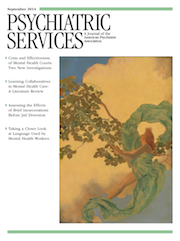Persistence in Treatment for One Year Among Patients in Nigeria With First-Episode Schizophrenia
Abstract
Objective
The aim of this study was to examine the magnitude of poor persistence in treatment among patients with schizophrenia and to identify associated factors.
Methods
All eligible patients (N=216) seen at the University College Hospital in Ibadan, Nigeria, over a five-year period were retrospectively followed up until the time of their last visit. Time to first default was examined by Kaplan-Meier survival analyses. A log-rank test was used to compare survival times for different variables. The contribution of the variables that affected time to default was examined by Cox regression analysis.
Results
Only 24% of the sample remained in treatment at the one-year follow-up. Persistence as measured by mean±SE time to all-cause treatment default was 17.80±1.44 weeks. Of several variables examined, including whether patients were taking first- or second-generation antipsychotics, none were found to predict persistence.
Conclusions
Persistence in treatment of patients with a first episode of schizophrenia was low.



